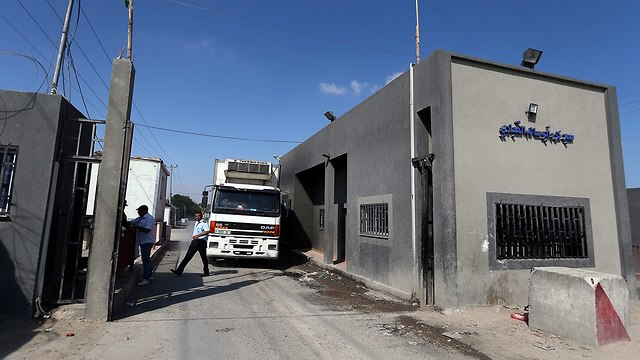

Egypt gives Hamas a few days to end kite, balloon terror
After Israel announces closure of Kerem Shalom crossing, Ynet learns Cairo ramps up the pressure on Hamas terror group, warning it to completely stop or significantly reduce number of incendiary balloons and kites launched into Israel that have sabotaged an Egyptian-brokered ceasefire.
The ultimatum came after Israel announced on Monday evening that it would be closing the commercial Kerem Shalom crossing to gas and fuel supplies after a ceasefire agreement was violated earlier in the afternoon when a rocket was fired into southern Israel.
Before the Israeli announcement, the Egyptians also announced the same evening that they were temporarily closing the Rafah crossing due to a technical malfunction. However, it was not immediately clear whether the Rafah closure was incidental or coordinated with Israel in a bid to pressurize Hamas to cease its terror activities that threaten to escalate the conflict on the border.
Ynet also learned that Hamas reiterated a message it had already conveyed to Cairo this week that it is unable to end the phenomenon.
However, Hamas has insisted to Egyptian intelligence officials, who are mediating between the sides, that its men are indeed working to reduce the number of incendiary balloons.
While such claims are difficult to prove in the current volatile climate, particularly as several fires caused by the flaming kites and balloons broke out throughout Monday, a notable drop has been recorded in the number of launches since the major flare-up that took place between Israel and Hamas over the weekend.
“Hamas cannot stop the launching of the balloons in one go because it will damage its position in the eyes of the Gaza residents and those who support it who will see it as a collapse. Therefore, it has to do it gradually,” once source in Gaza told Ynet.
Israel’s announcement that the Kerem Shalom crossing would remain shut only until Sunday also possibly indicates to Hamas that it prefers to give an opportunity to restore calm than to engage in another round of violence.
Meanwhile, Hamas evacuated forces on Monday which were deployed along the entire border of the Gaza Strip, guarding against rocket fire by rogue elements and preventing infiltration into Israel.
Sources in the strip told Ynet that the decision was taken after the IDF attacked two military observation posts on Monday that belonged to the forces, fearing more casualties.
A rocket launched from Gaza landed in open space in south Israel on Monday evening, despite a Sunday announcement from Hamas and Islamic Jihad that a ceasefire had been reached with Israel after the region witnessed a wave of violence over the weekend.
Minister Tzachi Hanegbi, who serves as an observer in the Political-Security Cabinet, welcomed the Egyptian ultimatum, but said that Hamas’s response was “unacceptable.”
“Hamas says we’ll burn you, but more slowly. This isn’t acceptable,” he said in an interview with Ynet. “It can be stopped immediately. Everything is coordinated, funded and organized by Hamas and as long as the fire terror continues, so will the blows that were deliver to Hamas.”
Egypt, the minister continued, was making positive efforts in the conflict, “but they appear not to be succeeding in making it clear to Hamas the price of this tactic that we will not accept.”
Asked what would happen if the ping-pong violence continued until Sunday when Israel said it would reopen the Kerem Shalom crossing, Hanegbi explained that Hamas had only recently changed its policy towards Israel.
“It’s important to understand things over time. For three-and-a-half years there was unequivocal deterrence. Hamas not only stopped firing but it also acted against rogue cells that fired from time to time,” he said.
“In the last half a year, we have seen a new policy to challenge us again and again. It began with marches and breaching the fence. It ended with 147 dead Palestinians. It seems that they are not bothered by the fact that there are funerals again and again in Gaza.”
Regarding Israel’s decision to close the Kerem Shalom crossing, Hanegbi said that it was a necessary step to make clear to Hamas that there is a price to be paid for its actions.
“The extent to which this will be effective is not clear, but we cannot sit idly by. That’s why what was chosen were measured responses,” he said.
“Hamas has chosen to make two million people miserable who are, in practice, in the biggest prison in the world. The Palestinian public isn’t rising up against Hamas and I agree that the chances of them doing so are slim, but we have a basket of actions and they deserve no perks,” Hanegbi continued.


















